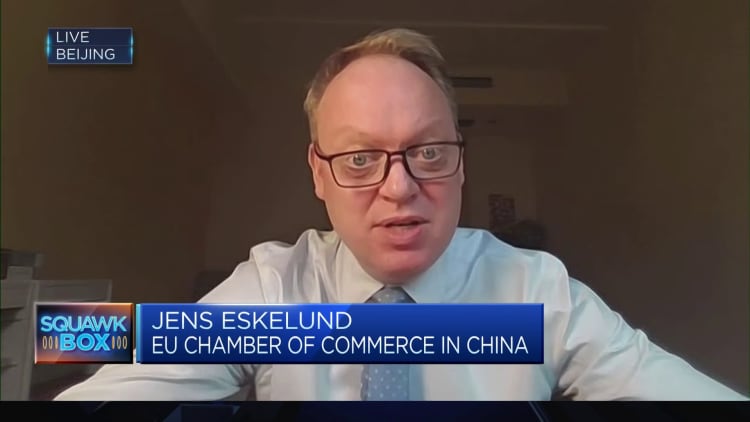BEIJING — Europe has launched an investigation into Chinese electric vehicle subsidies, but no assumptions should be made about the probe’s outcome, the head of trade for the European bloc’s executive branch said Tuesday.
About two weeks ago, the European Commission announced an investigation into government subsidies for EV makers in China.
The probe focuses on subsidies for electric vehicle production, and will be “fact-based,” Valdis Dombrovskis, executive vice president and trade commissioner of the European Commission, told reporters Tuesday. He was speaking in Beijing after a four-day trip in China.
The investigation will be in line with EU and World Trade Organization rules, and involve engagement with Chinese authorities and businesses, he added.
“The outcome of investigation is going to be determined by those ... [I] cannot prejudge the outcome of the investigation,” Dombrovskis said.

China’s electric car exports have surged in recent months. When considering exports of all types of cars, China’s have already surpassed Germany’s, and are on track to surpass Japan’s this year as the largest car exporter globally, according to Moody’s.
Homegrown Chinese electric car companies Nio, Xpeng and BYD are among those that have started to expand to Europe, but in relatively small numbers so far. More than two-thirds of China’s electric car exports to Europe were from Tesla and other international brands manufacturing in China, according to HSBC.
However, the future consequences for business are great.
Dombrovskis noted the EU plans to phase out sales of internal combustion engine cars by 2035. He also said the share of Chinese EV brands in the EU market has gone from less than 1% to 8% in the last two or three years.
The other element of the EU’s subsidy probe is “risk of injury” for the European auto industry, he told reporters.
European auto giants such as Volkswagen derive significant sales from China but have struggled to penetrate the highly competitive electric car market there. Earlier this year, VW and EV startup Xpeng announced a strategic partnership through which they would jointly develop cars for the Chinese market.
China’s Ministry of Commerce was quick to criticize the EU investigation and called it a “blatantly protectionist act” that would distort the global auto industry.
Cui Dongshu, head of the China Passenger Car Association, also said in an online post that China’s new energy vehicle exports are growing because of a highly competitive domestic supply chain and market environment.
On Tuesday, Dombrovskis told reporters that the EU probe into EV subsidies was raised in pretty much every meeting with his Chinese counterparts.
China’s electric vehicle ambitions started well over a decade ago. Former Audi engineer Wan Gang became China’s Minister of Science and Technology in 2007 and convinced the central government to roll out a national strategy for developing new energy vehicles and battery technology.
Between 2009 and 2015, the central government spent at least 33.4 billion yuan ($4.57 billion) in subsidies on developing electric vehicles, according to the Ministry of Finance. Beijing has tended to lump EVs into the broader category of new energy vehicles.
The government-led push was not without waste. In 2016, the Ministry of Finance said it found at least five companies cheated the system of over 1 billion yuan.
The country’s more recent electric car-related subsidies have focused on tax breaks for consumers. Electric cars are considered one of the bright spots in China’s slowing economy, and a driver of advanced manufacturing, retail sales and exports.
© OfficialAffairs